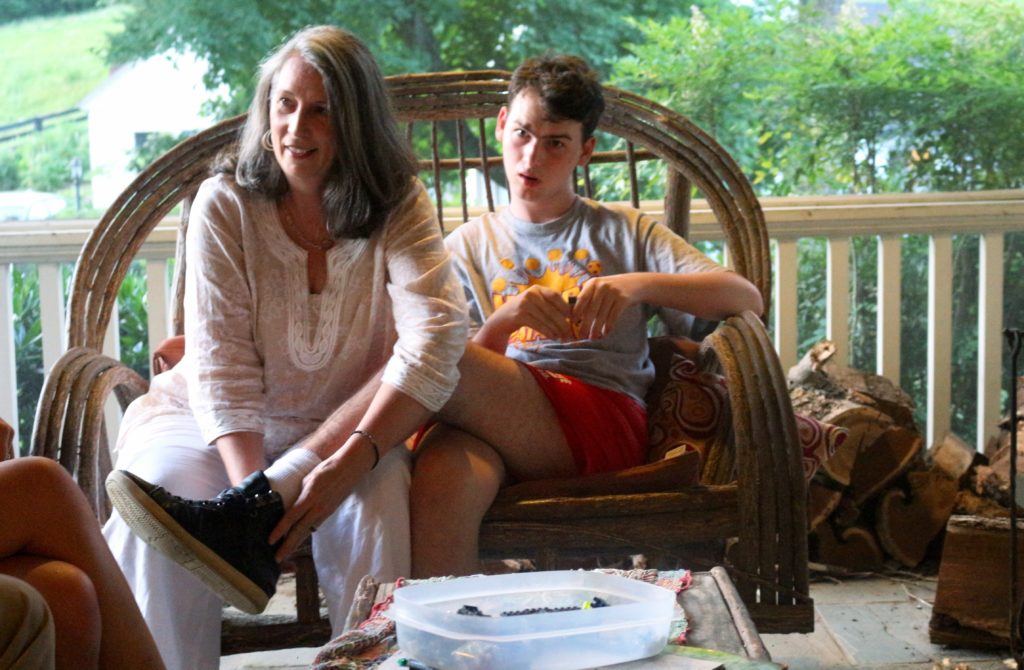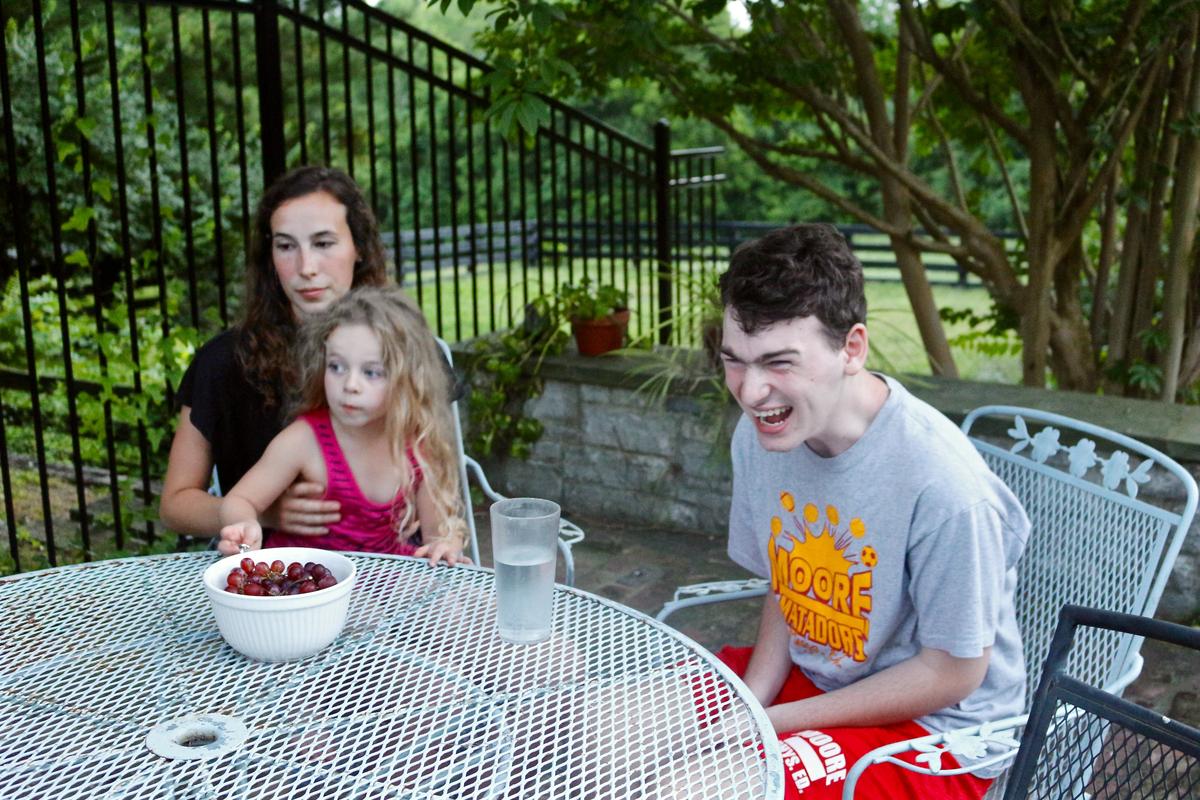
Terry Jo Bichell is cut off in the middle of her sentence by a loud shout.
“That’s Louie, giving his two cents worth,” she says with a smile. “Even though he can’t talk, he can make himself heard, let me tell you.”
Bichell and her family live in a laidback farmhouse in Brentwood, where she’s a doting mother to her 16-year-old son Louie. He’s tall and friendly, and he loves dessert. His gestures are often clumsy. She does her best to interpret them.
“Right now,” for example, “he’s pointing over there to say that he would like a few more of the crackers that he just ate.”
Or before dinner, when he angrily bangs on the table. “I do know why he’s mad,” she says. “Dinner is taking too long!”
Or during dinner, when he presses symbols on a talking iPad. “I need,” the iPad says.
“What do you need, babe?” she replies. “That’s good that you’re talking.”
Louie presses another symbol. “To poop,” the iPad says.
He presses the combination again and again. “I need to poop,” it says. He cracks up, howling. His laughter is infectious.

Louie has Angelman
syndrome, a rare genetic disorder caused by the deletion of one gene in the brain. It creates a severe intellectual disability. People with Angelman
usually can’t talk, and they have trouble with motor skills and often suffer from seizures.
But scientists have been making unprecedented strides on research. Multiple independent researchers think they’re closer than ever before to treating the severe symptoms of the disease — and some think they can one day even cure it altogether.
The advances in science have some parents wondering: Can you really reverse an intellectual disability? And, if you can — should you? These questions have led to complex debates within the Angelman community over what it means to cure the disorder — and whether such a drastic measure is necessary to improve people’s quality of life.
The Ultimate Commitment
For Bichell, the answers to those questions are simple: yes and yes.
She and her husband Dave, a pediatric heart surgeon, didn’t realize Louie had Angelman syndrome until he was about a year old. They noticed he was developing differently than his older sisters. For example, he wouldn’t crawl, Dave says, he would just scoot around on his bottom.
“It became much more efficient than crawling,” he remembers. “In fact, we thought he had discovered something pretty bright.”
But then they got the diagnosis, and 15 years ago, what was known about Angelman was upsetting.
“Seizures, developmental delay, no speech,” Dave says. They found out, fortunately, that Louie would have a normal life span. Still, “the descriptions were all pretty devastating.”

His wife, Terry Jo, immediately started meeting with Angelman
researchers. She read scientific papers every night after putting her kids to bed and signed Louie up for any clinical trial she could find.
She believes, with enough hard work, she can find a cure for Louie. She knows it sounds crazy to some people, but she says, look — her husband is a pediatric surgeon.
“If he can fix these impossible things with these babies’ hearts, why can’t we just turn one gene on? How hard can that be?” she says. “Life is hard. I mean, raising kids is hard. Going to work is hard. Everything’s hard.
Everything’s hard. This isn’t harder than anything else.”
A few years ago, Bichell made what felt like the ultimate commitment: She went back to school to get a PhD in neuroscience at Vanderbilt so she could research Angelman herself. She
helped discover a method of testing whether treatments are working. That discovery, combined with the fact that some very promising treatments are going to clinical trial soon, has Bichell very excited.
“We could actually reverse an intellectual disability,” she says, her voice rising. “I mean, my kid might get up and say, ‘Pass the salt.’ “
Approaching Treatment With Caution
Researchers agree this is possible, but they add this footnote of caution: Even if the treatments are effective, they would probably just make it easier to learn. Patients would then have to do the learning, which takes a long time.
“I think in some family’s minds, the word ‘cure’ connotes there’s a switch that goes on, and suddenly the child will begin to be different and will start speaking fluently and offering his or her opinion about dinner that evening,” says Elisabeth Dykens, director of the Vanderbilt Kennedy Center. Dykens researches rare genetic syndromes, including Angelman.
“I think that it’s tantalizing. My fear is that what I don’t want to have happen is a false hope for parents.”
But while some parents are longing for a miracle cure, she says, others have the opposite reaction: They’re frightened about changing who their children are.
“I think there’s an idea that many parents have that a cure means you’re going to obliterate my child,” Dykens says.
“You have parents who say: ‘I’m not interested. I love my child the way he or she is. This child has added meaning into our family that would otherwise not exist, and I don’t want to change that,'” she says.
Dan Harvey, a California neuroscientist who also has a teenage son with Angelman, says he wants his son and others like him to have a better quality of life. But he’s cautious.
“If we go in and change the behavior of that one gene, that in principle is going to make them a very, very different person,” he says.
He worries about the side effects of treatment. He wonders if his son even wants to be treated.
“They just want to find a place in society where they can be happy and enjoy life and participate,” he says. “Individuals with Angelman syndrome have difficulty expressing that, because of the communication limitations that they have. But I think that’s what we’re looking for here.”

For Terry Jo Bichell
, there is no question about whether she’d sign up for treatment for her son.
“I see in Louie that he’s in there, and he’s trying to get out,” she says.
But a
s excited as she
gets about finding a cure for her 16-year old son, she acknowledges it might be too late. S
cientists say these drugs are likely to be most effective on little kids, before they develop.
“Some of the reactions we get,” she says, “where people look at me like I’m in some fantasy world — I mean, maybe they’re right in terms of Lou. But we fought the good fight, right?”
She may end up fighting it for someone else’s child.


